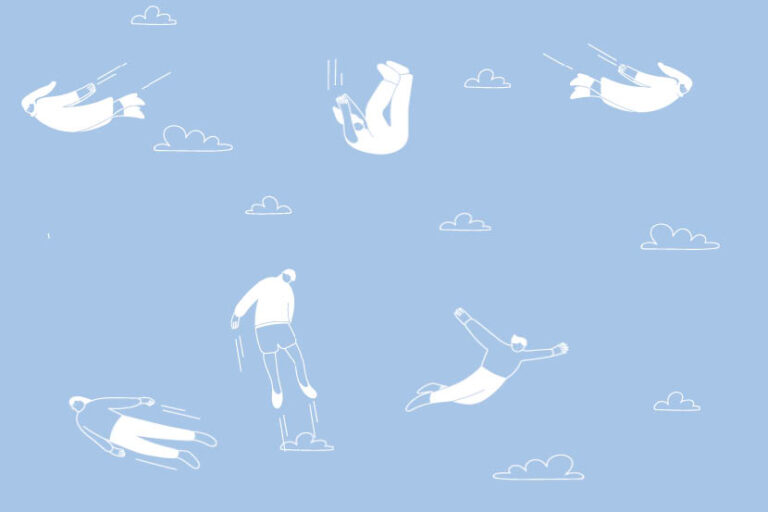
The all-or-nothing approach to success is so dominant that it’s easy to forget there are other ways to prosper.
I never liked running. So, when my physiotherapist suggested taking it up to reduce back pain from a previous career in figure skating, I wasn’t overjoyed. Undeterred, however, he said to start slowly, to run between two markers, and build from that point. With this quiet encouragement, I decided to try again. And I did start slowly. I refused the inner urge to go faster. I would stop if I felt an unusual twinge. No pain, no gain? More like no pain, no pain.
But beginning gently and building up almost imperceptibly proved effective. The physical benefits soon became apparent. As sports and rehabilitation therapist Jav Asaro, who is also my physio, says: ‘Where appropriate, running can be a great exercise for strengthening and providing positive effects on intervertebral discs, core, diaphragm, pelvic floor, and postural muscle.’ But there was an unexpected outcome, too. Maintaining fitness became more manageable and enjoyable. It seemed as though the method needed changing rather than the sport.
The running was fine and created a sense of relief. The process wasn’t stressful but fun and exciting. For some, it could be that a gentler introduction or reintroduction into physical activity can be as beneficial, if not more so, than an intense approach. ‘Properly timed progressions are the quickest and most effective way to make physical gains for anyone starting or transitioning back into physical activity,’ says former English rugby league player Davide Longo. A suitable program will take into account various factors, such as skill level, previous injury, and personal goals.
Arguably, a lighter introduction and run-in aren’t always given equal consideration. Yet if this helps to lead to a sustained exercise routine, it can also bring psychological benefits such as reduced anxiety, better sleep, and a general boost in mood. With a more relaxed attitude, stress and fatigue from overdoing an activity might also be minimised, which could make it easier to stick with a routine and increase motivation and staying power.
Kala Flynn, a life coach and author, explains: ‘Avoid limiting yourself to bigger goals such as “I’ll be happy once I’ve run a marathon.” You can get just as much fulfilment from an extended walk and taking in nature’s surroundings, birds, and trees. In those moments, enhancing your awareness of what you’re seeing, hearing, and feeling is enough to stimulate your senses and wake up the cells in your body.’ It’s an approach that aligns more closely with a broader view of success, ‘the accomplishment of an aim or purpose’. Considered within this dictionary definition, success can be measured as a daily stroll to the local store as much as the winning of an Olympic gold medal.
Breaking down tasks into bite-sized pieces might be the key to sustaining progress and getting further.
Trying a new sport, or returning to one, can be daunting, especially if there’s pressure to go all-in and give it everything you’ve got. The exhortation to go hard or go home will undoubtedly work for some, but it’s not a universal solution.
‘If you go from one extreme to the other, you can end up burning out without even realising it,’ says Kala. ‘It’s good just to keep moving rather than not doing anything at all. You don’t have to see the whole staircase to take the first step.’ Put like this, it’s possible to see how the start-slowly approach can apply as equally to writing a novel or pursuing a new career path, as it might to improved fitness. You just need to break it down and consider that every aspect of the task, no matter how imperceptible, will take you a fraction further. Here are a few things you might try:
- Want to be a bit healthier? Just do five star jumps or push-ups a day for a week and then try it for a month or two.
- Want to draw more cartoons? Sketch one every Tuesday when you have a spare minute.
- Struggling to write an article? Compose a couple of sentences or one paragraph twice a week and see where it goes.
- Want to progress in your career? Email one contact this week.
It seems contradictory to think doing less can become more. But breaking down tasks into bite-sized pieces might be the key to sustaining progress and getting further. Of course, there’s no one-size-fits-all approach and to perform or create anything at a high level requires work, but there’s no shame in starting slowly.
I thought I could never run. I was about to give up on it entirely. But now I’ve realised I can do it, my way. I can run for 18 minutes now, three times a week, with no thoughts of giving up. And I’ve kept that up for three months, smashing my past record, which was, sadly, somewhere around the two-week mark. I know 18 minutes isn’t a marathon, but it’s something, and it counts. So, next time there’s a task to tackle, try focusing on that first small step.


















